|
|
|
Sort Order |
|
|
|
Items / Page
|
|
|
|
|
|
|
| Srl | Item |
| 1 |
ID:
148875
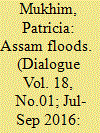

|
|
|
|
|
| Summary/Abstract |
There has been a glut of social media activism vis-à-vis the floods in
Assam. But the ardour of online activism can have disastrous
consequences because issues taken up on social media are transient.
There was a lot of anger and bitterness that the “national” media failed
to give due coverage to the Assam floods. This is a perpetual grouse
and it is as predictable as the monsoons. After Home Minister Rajnath
Singh’s visit and the media focus that the visit got, one gets to read less
and less about the flood affected except from the good old newspapers
which follow up the flood stories assiduously
|
|
|
|
|
|
|
|
|
|
|
|
|
|
|
|
| 2 |
ID:
148882
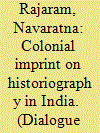

|
|
|
|
|
| Summary/Abstract |
Politics has subverted historiography in India for nearly two centuries.
The tendency has persisted even after independence due to political
patronage
|
|
|
|
|
|
|
|
|
|
|
|
|
|
|
|
| 3 |
ID:
148888
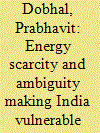

|
|
|
|
|
| Summary/Abstract |
Energy is a vital component of development and its utilization pattern
is significant determinant of the growth of a nation. So its quantity,
quality and sources of availability are important elements in the
measurement of a country’s comprehensive national power. Rapidly
increasing energy demand and growing concern about economic and
environmental consequences call for an effective and thorough energy
governance in India. Strengthening our fuel reserves and diplomatic
relationship with a wide range of oil rich nations; developing technology
to nurture indigenous energy resources such as hydroelectricity, wind
and solar energy along with efficient machines/mechanisms for energy
use/distribution and honest policies framing to get rid of ambiguity
over all these issues can be the panacea for resolving the energy crises
in India.
|
|
|
|
|
|
|
|
|
|
|
|
|
|
|
|
| 4 |
ID:
148879


|
|
|
|
|
| Summary/Abstract |
In the lifetime of the older ones among us, freedom of expression in
India first became a hot item with the Salman Rushdie affair, when in
1988, his novel The Satanic Verses was banned. This was done by
Rajiv Gandhi’s Congress government at the request of Muslim leader
Syed Shahabuddin, in exchange for the latter’s calling off a Muslim
march on Ayodhya (then a hotspot because of the temple/mosque
controversy) expected to cause bloodshed.
|
|
|
|
|
|
|
|
|
|
|
|
|
|
|
|
| 5 |
ID:
148881
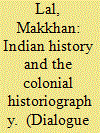

|
|
|
|
|
| Summary/Abstract |
In India historical knowledge was always given importance to the extent
that Kautilya’s Arthashashtra prescribes that king must spend his
afternoon hearing the Itihas Puranas from knowledgeable scholars.
The Puranas were the preserve of Indian history. Subsequently, much
of the historical knowledge has been enshrined in Sanskrit literature,
dealing with the various subjects and aspects of Indian society. After
the arrival of the Mughals a tradition of court historiography began
where rulers commissioned the historical account of their reigns. This
has not been the tradition in India during the pre-Mughal periods.
Whatever was written was written by independent scholars. With the
advent of Europeans, history of India started being written by them.
This can be divided into two phases.
|
|
|
|
|
|
|
|
|
|
|
|
|
|
|
|
| 6 |
ID:
148880


|
|
|
|
|
| Summary/Abstract |
Activism and programmes have proliferated both in India and elsewhere
that purport to help ‘Dalits’. In this essay, we shall consider the
proposition that they are not quite what they seem to be, and consider
whether they are intended per se to support the so-called ‘lower-castes,’
as they may have other ill-effects and could well be malafide
|
|
|
|
|
|
|
|
|
|
|
|
|
|
|
|
| 7 |
ID:
148876
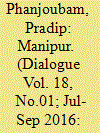

|
|
|
|
|
| Summary/Abstract |
In any discussion on Manipur at this juncture, be it development, culture,
capital investment, ethnic tensions, education, trade and commerce,
youth unrest and for that matter practically every area of activity in the
state, including the fine art of statecraft, one overwhelming question
remains the common denominator – the law and order situation. This
question looms over every other issue and more often than not, its very
presence freezes all other discussions, making them redundant. In
contemplating Manipur, it is with sadness one is reminded of the rather
cynical little parable from the kindergarten books, of the mice community
making big plans about their future and suddenly realizing before any
of their plans can be executed, the cat in the house will have to be
belled.
|
|
|
|
|
|
|
|
|
|
|
|
|
|
|
|
| 8 |
ID:
148883


|
|
|
|
|
| Summary/Abstract |
The basic notions of history inherited by western academia were
influenced by what was regarded as “common sense” knowledge, even
though it was explicitly or subconsciously shaped by Biblical
chronologies and the time “ceiling” that they set for the creation of the
world. Nineteenth century positivists beginning with Auguste Comte
built a theory of evolutionary progress starting from early religious
societies, transiting through philosophically motivated ones and rising
towards the ultimate scientific stage of human rationality. Both socialists
and liberal thinkers generally held on to that vision of linear growth
from quasi-animal origins through ever higher stages of intellectual
complexity, industrialization and knowledge.
|
|
|
|
|
|
|
|
|
|
|
|
|
|
|
|
| 9 |
ID:
148878


|
|
|
|
|
| Summary/Abstract |
The French archaeologists carried excavations in Bình Ðinh Province
during early years of the twentieth century, and the Champa artifacts,
discovered during the same period, have been preserved in some
Museums in Vietnam and France, such as Museum of Vietnam History
in Hochiminh City, the Museum of Chãm Sculptures in Ðà Nang and
Museum of Natural History in France. However, archaeological finds
of Champa arts, discovered after 1975, are only exhibited in Bình
Ðinh Provincial Museum. But, finds of two excavations in An Nhon
and Tây Son Districts conducted in 2002, 2004 and the recent
excavation in Phú Yên Province in 2008 haven’t been still announced
in any monographs. For this reason, my research paper is for the
purpose of the studies of the latest archaeological achievements
reflecting the progress of Champa art as well as art relationship of the
Champa and contiguous kingdoms in Vijaya period. In the eleventh
century. The Champa art has been deeply influenced by other arts
such as the arts of India, Ðai Viet (former Vietnam), Angkor and Java.
Keywords: Kingdom of Champa, Hinduism Sculpture, Trinity
Divinities, Sacred animal, Vijaya, Bình Ðinh, Tháp Mam style, Bình
Ð Provincial Museum.
|
|
|
|
|
|
|
|
|
|
|
|
|
|
|
|
| 10 |
ID:
148877
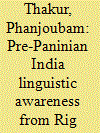

|
|
|
|
|
| Summary/Abstract |
Linguists all over the world agree that Panini is one of the greatest
grammarians in the world so far. Leonard Bloomfield (1887 –1949),
the American linguist who led the development of structural linguistics
in the United States during the 1930s and the 1940s considers his
grammar to be “one of the greatest monuments of human intelligence.”
|
|
|
|
|
|
|
|
|
|
|
|
|
|
|
|
| 11 |
ID:
148886


|
|
|
|
|
| Summary/Abstract |
The deliberations on sati in the post-independence era have largely
taken place within the parameters of Lord Bentinck’s Regulation XVII
of 1829. That Regulation, which declared sati a criminal offence, marked
the culmination of a sustained campaign against Hinduism by British
evangelicals and missionaries anxious to Christianize and Anglicize
India. The attack on Hinduism was initiated by the evangelical, Charles
Grant, an employee of the East India Company and subsequently member
of the Court of Directors. As early as 1786, he presented a Proposal
for the establishment of a Protestant mission in Bengal and Bihar. In
1792, Grant prepared a draft of his famous treatise, Observations on
the State of Society among the Asiatic Subjects of Great Britain, which
elaborated the scheme sketched out in the Proposal.
|
|
|
|
|
|
|
|
|
|
|
|
|
|
|
|
| 12 |
ID:
148884
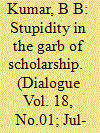

|
|
|
|
|
| Summary/Abstract |
India’s encounter with the West after discovery of Sanskrit generated
sympathetic chord among many Western thinkers. Oriental Renaissance
(movement) was erected on the foundations of Sanskrit. F. Schlegle,
Schaupenhauer, Schillar, Schelling, Schleismacher, F. Nork, F. Majer,
J.G. Herder, Voltaire, Burnouf, Wagner, Tiek, among others felt oneness
with India. Even Tolstoy sought a cure for the Western spirit in India
|
|
|
|
|
|
|
|
|
|
|
|
|
|
|
|
| 13 |
ID:
148887


|
|
|
|
|
| Summary/Abstract |
The issue of region, regionalism and sub-regionalism are, perhaps,
contested owing to their varied interpretations and approaches. However,
South Asia is widely recognised as a region which roughly includes the
territory between China in the north and the Indian Ocean in the south;
and between Afghanistan in the west and Myanmar in the east, because
of geographical contiguity, shared history and cultural identity of the
countries composing it. South Asia had developed a ‘regional complex’
even before the British colonial period.
|
|
|
|
|
|
|
|
|
|
|
|
|
|
|
|
| 14 |
ID:
148885


|
|
|
|
|
| Summary/Abstract |
Wendy Doniger is a Professor of Religious History at the Chicago
University (USA). Her fame is for being an Indologist. In the West she
has guided highest number of Ph.D.s on Hindu religion and Sanskrit
texts. Considered such an authority on Hindus that she is also called
‘queen of Hinduism.’ Not long ago she was in news because of her
book The Hindus: An Alternative History (2009). It’s print version was
withdrawn from the market by the publisher Penguin-Viking. Some
Hindu organizations had lodged a plaint in the court asking for a ban
as wrong and defamatory statements against Hindu deities abound in
the book. During the court proceedings both parties to the case came
to a mutual settlement under which the book was withdrawn from the
market
|
|
|
|
|
|
|
|
|
|
|
|
|
|
|
|
|
|
|
|
|